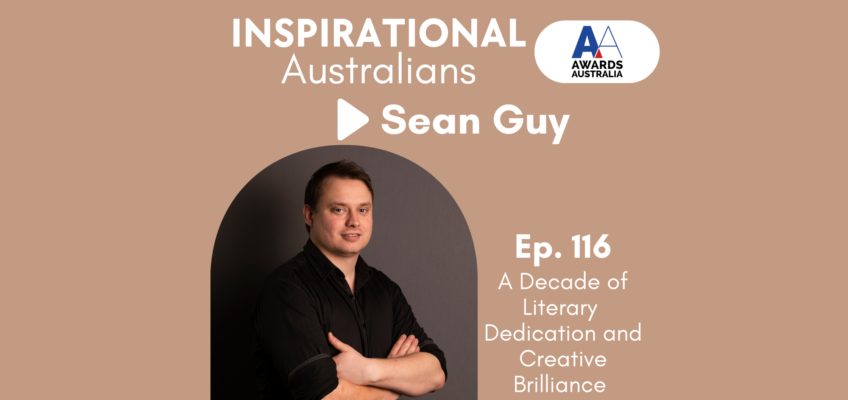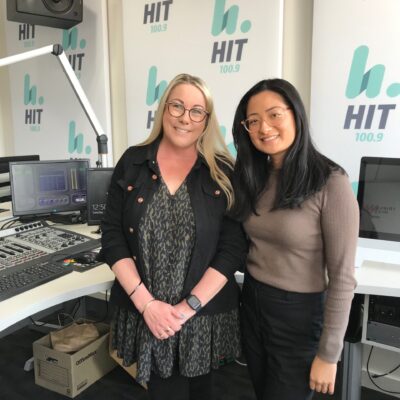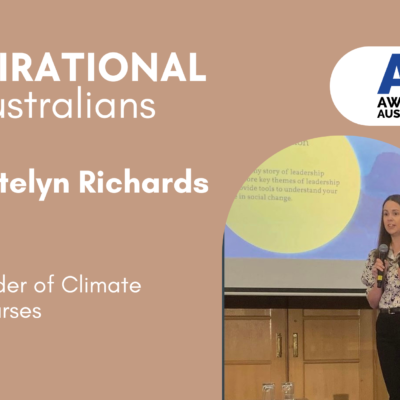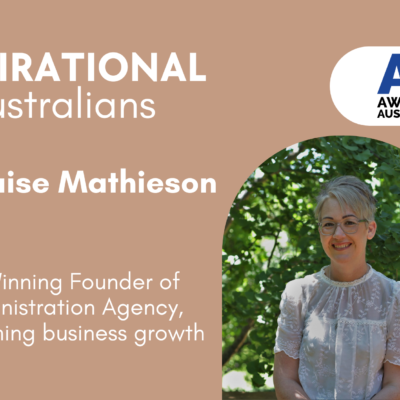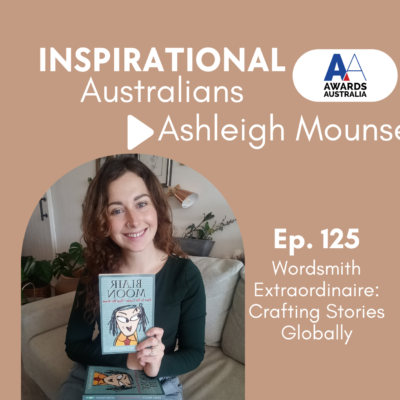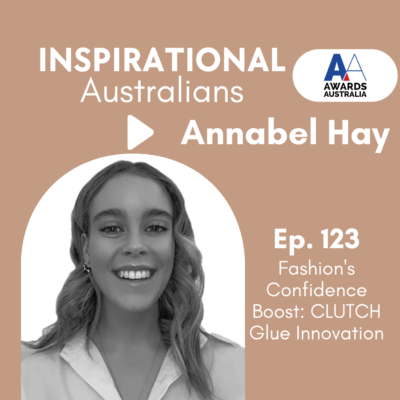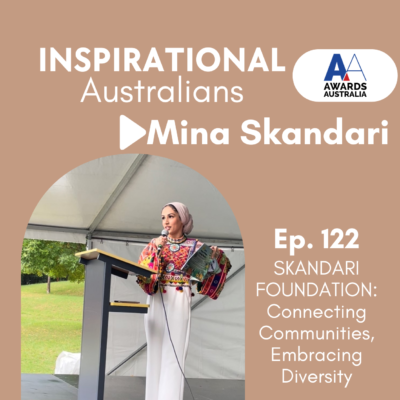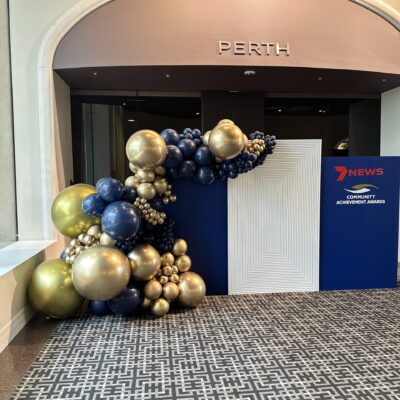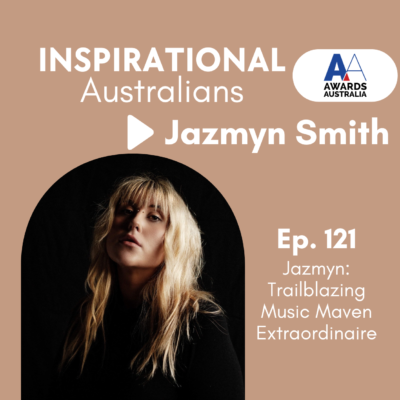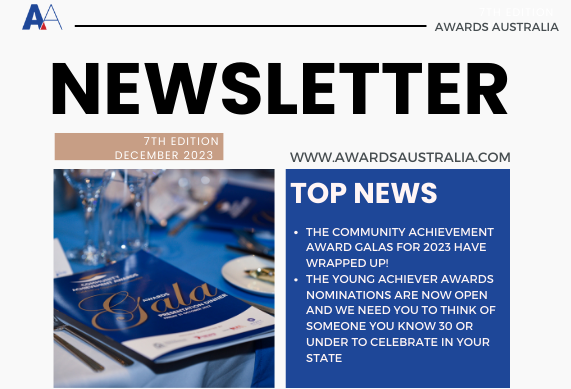.
In this week’s episode, Josh chats with Sean Guy, a member of the Darwin Theatre Company board and the winner of McDonald’s NT Career Achievement Award in the 2023 Northern Territory Young Achiever Awards.
Sean Guy has been working at the Bookshop Darwin for over eleven years. In his time there, he has demonstrated creativity, innovation, and a genuine passion to support and engage with the community. In his career as an author/playwright, he has written four successful books, joined the Darwin Theatre Company board, and had plays performed around the country. Listen now on Spotify, Apple Podcasts or Google Podcasts.
#makingadifference #positivestories #inspirationalstories#podcast
If you enjoy the Inspirational Australian’s Podcast, we’d love it if you could subscribe, rate and review. Find out how here.
Links
connect with Sean Guy on Instagram , Linkedln and Febook
Follow us on our Inspirational.Australians Instagram Page
Want to recognise someone making a difference? Nominate them now in 2 mins!
Find out more about partnering with Awards Australia
Transcript
[00:00:08] Inspiring Australians Podcast [00:04:16] Shaun Guy Author Account – Shaun Guy Author Account [00:06:15] Is Your Writing Improved Once You Give Yourself Permission? [00:08:21] You’re Super Young to Write [00:11:08] Fade the Parking Meter [00:12:09] How Did You Write Your First Novel? [00:15:22] Book Review – Percy Jackson Series [00:16:47] You’ve Got One Career in the Arts [00:19:49] Man Booker Prize Winners Miles [00:21:36] Acting in Theatre Company Plays [00:23:04] Amateur Theater Is Undervalued [00:24:13] Amateur Theatre [00:25:19] Is It So Important to the Arts? [00:29:30] The Next Step Is Not Just a Sketch Show, But An Actual Tour [00:31:37] Darwin Fringe Awards [00:35:48] Screenwriting – I Learnt More Than Anyone Has Ever Learned About Screenwriting [00:37:27] Screenwriting – The Genre Or the Form I Just Want to Write [00:39:52] The Young Achievers [00:42:13] What Is It That Inspires You? [00:43:59] Good Storytelling – I Love Matthew Rowley [00:44:47] New Australian Contemporary Funny Play [00:45:42] The Inspirational Australian’s PodcastSTART OF TRANSCRIPT |
[00:00:59] Josh
Hello and welcome to this week’s episode of the inspirational australian’s podcast for your weekly dose of inspiration. This week I’m joined by Sean guyer, who is from Darwin, Northern territory. And I love speaking to people from nt because it’s my favourite place, I think in Australia to visit. It’s just if you haven’t been there, you have to go. Hopefully the tourism board was fun to meet soon. But for now, I’m speaking with Shaun who is the twenty twenty three winner of the McDonald’s anti career achievement award as part of Northern territory. Young achiever awards, and Shaun has a really cool career. It’s not your typical career. I wouldn’t think, but it’s so awesome to hear from people who have thought about things a bit differently to use their passions and what they really enjoy doing to help that you know, to direct that career. So Shaun has worked at the bookshop, Darwin for eleven years, and it is time that he’s demonstrated creativity, innovation, and a genuine passion to support and engage with the community. On top of that, in his career as an author and playwright, he’s written four successful Books, joined the Darwin, Theatre company board, and in plays performed around the country and fringe shows in multiple states. It’s a pretty cool career and tell me a bit more about it. I’m joined by Shaun. Welcome. How are you doing?
[00:02:16] Sean
Hey, thanks so much for having me. Absolute pleasure. So you know, I’ve talked about how I love the nt. First. You got to tell us what it’s like there at the moment in the wet season in the dry season. What’s going on? Yeah, it is lovely up here. Maybe we can both get sponsored by the tourism board and just travel around to the National parks for a few weeks or something. Now, that is lovely at the moment it’s. It’s always hot, it’s hot and dry. In the dry season, it’s hot wet in the wet season, but at the moment it’s, you know, it’s getting a little bit humid, but it’s still kind of the dry. So heading into the build up, it’s a lovely time to be here and the evenings is so cool and there’s always a nice breeze. And there’s always a lovely market and you know, some great walks. It’s just the best place to be honestly,
[00:03:00] Josh
are you from Darwin, Sean?
[00:03:03] Sean
I’m actually born in Adelaide and then spent a little bit of time in Canberra for my sins and then went to Melbourne where I sort of did some growing up, I guess lived in Doncaster. Then moved to the nt just before I finished high School and I’ve been here now however long that is about thirteen fourteen years and I just love it here. I would, I’ve bought a house. I don’t have any plans to move back down South in the near future.
[00:03:29] Josh
Yeah, brilliant. So I’ve got to ask you, where did you go to high school then?
[00:03:33] Sean
Oh, I went to high School in Melbourne in Doncaster, secondary college and princes hills, secondary college. And up in the end of that community college, which is now known as haileybury Rendall because it got bought out.
[00:03:48] Josh
Oh right. Well I only ask because I grew up in a similar area. So I was yeah, I went to high School in the area as well. So not the same one, but that’s so interesting. It’s funny how you know, being the same place and then you never know where in the world you end up.
[00:04:02] Sean
We probably cross paths if you played cricket or something.
[00:04:06] Josh
You go more of a basketball player to be honest, but I was, I do want to get out there in the sun. My pale skin wouldn’t handle it.
[00:04:14] Sean
So that’s a good cool. I should have done basketball too. I was used to cricket.
[00:04:19] Josh
So yes, I just love, you know, obviously I had my own intro there which is from our awards when you’re a finalist and obviously then a winner in our awards. But I must say, I can tell you’re a writer because in preparation for this podcast, I read the bio on your website, was plug the website, so I keep it the right. You know, I wrote the Shaun guy author account and I can tell you a writer because your bio on your website is bloody awesome. And I’m, I wish I had time to summarise it down to a good a version. So I use it for the podcast. So I want to know, I guess there’s a long lead up to the my question, how did your passion for writing start in the first place?
[00:05:05] Sean
It’s a great question, but yeah, it’s kind of a I guess it’s kind of a boring answer in the sense that like it just, I was just born that way, which I know sounds cliche, but I totally was I from the age of about three, you know, when most kids are playing with their toys, you know, I’d play with them a little bit. And then I sort of go to mum and dad. All right, write that down. That’s where we’re up to today. You know, continue the story tomorrow. And that’s and that’s how it was my whole childhood. The first book I ever wrote was this collection of short stories about, you know, my monkey Teddy and my frog Teddy. And you know, the adventures they got to and then I just kept doing it all through primary school. I was just obsessed with writing stories, you know, parodies basically of Lord of the rings and Star Wars is watching it. And then when I moved to the end, actually that was when I, as a teenager, you know, about fourteen or fifteen or whatever it was. And I was entering things like the young author awards. And I just, I stopped introducing myself as you know, a nerd who sort of like to write and start introducing myself as a writer and, and just kind of made that part of my identity and it has been ever since. So yeah, it’s good fun.
[00:06:15] Josh
Did you, did you find that your writing improved once you gave yourself permission to say, hey, I am an author.
[00:06:22] Sean
That is a lot of questions that I’ve never been asked before and yes, I think it did. That’s such a great question. Yeah. Once you start, you know, you absorb it and then you take it on and, and you allow yourself to do it. Yeah, I think definitely it just, it becomes something that you take more seriously. And in fact, I think I get better every year because even in the last sort of seven to five years, since I’ve started publishing the Books and getting plays out there, I’ve taken a lot more seriously. And I’ve done a lot more courses and had a lot more mentors and I just, I think I get better every year. It’s really
[00:06:56] Josh
well, not obviously being, you know, really in the writings scene myself, just anecdotally and I do love reading Books. It does seem that there’s a certain age almost for authors like once you know, and again, this is just my perspective of it, like they’re fifty or, or whatever and they releasing that, you know, really famous and popular Books. Now you’re starting quite young from your perspective. Do you ever think about that?
[00:07:23] Sean
Yeah, I think some of the great authors that I follow definitely didn’t make it till they were in their forties and fifties, and particularly the ones you hear about that when things like the man Booker or the miles Franklin awards. And you know, it’s been a novel, they’ve been working on for fifteen years. That’s a big part of the industry. Those are kind of the household names in a lot of senses. But I think there’s also the other flipside. I write a lot of historical fiction and Urban fantasy and kind of fun, a bit less literary stuff. And I think there’s a lot of authors in my demographic, you know, the twenties to thirties to early forties who are just writing that stuff for their own fun and pleasure. And then, you know, they’re finding a bit of an audience and making it, you know, online or self-publishing or, you know, the people like Colleen Hoover out there who’s just taken the world by storm. I think she wrote twenty or thirty Books before she even got traditionally published. And so yeah, anyway, I think long story short, I think there’s a huge market out there for young authors and also younger readers. You know, we’ve got to keep telling stories that are relatable for people in their teens and twenties and thirties because it’s just, it’s so important that people are reading.
[00:08:30] Josh
Yeah, no, that’s really true. Well, it’s a really cool story, going back to how you were just writing those stories, you know, before you could even write you were, you were making those stories, which is awesome. Speaking of being, you know, Super young to write. I noticed on your biography, and I’m going to refer to your bio a couple of times because it’s so good. I also know a bit of fun trivia here that you were the youngest ever to write a front story article for nineteen years.
[00:08:54] Sean
That’s what they told me. Yeah I I was on work experience there when I was about sixteen and because I wanted to be a writer, but I didn’t know how to get into a career doing that. I applied for my work experience and years. I thought, oh, just do a week of journalism. You know, how hard could it be because I didn’t know I was a dumb teenager, and that was one of the best weeks of my life. I had some amazing experiences following journalists after all these crazy stories. I mean, you’ve seen the news headlines, they’re all crocodiles and snakes and all sorts of things. So yeah, I got to do a week of that and I wrote the best story was one day I was coming back from lunch and I had in my hand, you know, a can of coke and a Patty pie or something. And I had one of the journalists actually spotted me walking down the road and he was in his car and he pulled over and he said, hey, you’re the work experience kid, right. I barely knew is that, you know, we sort of crossed paths a couple of times and I said yeah, I’m sure. And he said great, come with me. I need, I need you. That’s all right. So I got in the car and we drove off. And, and as we’re driving down the Stuart highway, I said to him, so what’s the story? And he says, there’s a fire. And as a fire, what’s the fire? And it turned out the entity, worksafe, you know, who are the, the safe practice people of the nt, they had blown off the lid of their own incinerator when disposing of fireworks after territory day. And they’d started this fire, you know, ten minutes out of Darwin CBD. And so we get there. And we literally, I don’t know if I should admit this on the podcast, but we literally had to like jump fences to try and get in and get in and get a look around. And this guy next to me, he’s taken all these photos, and then we spot someone, you know, a policeman or a Council member or whoever was, I can remember. And he says, all right, we’ve got to go interview them. And I was like, great, I’ll, I’ll sit and watch or take notes or whatever you got me to do. He’s like, no, you’ve got to interview them. I’m just a cameraman. That’s why I picked you up. Wow. So I’m there with my notepad and my can of coke and, and I’m just, I’m like, all right, I’ll do my best. So I took all the notes and did the interview and we went back to the news office and I did have a bit of help, obviously editing it and formatting it. But yeah, that became the front page story. And to my knowledge, no other teenager in year ten at high School has ever done it for the news if any major you know, capital city newspaper. I mean not that I know of
[00:11:20] Josh
that is bloody brilliant. I love that story so much.
[00:11:24] Sean
It’s one of my favourites.
[00:11:26] Josh
I did work experience at channel ten and again, you know, in the media industry and I was kind of thinking about doing that kind of thing. And the most important job I was given was in that week was to fade the parking meter.
[00:11:44] Sean
When
[00:11:44] Josh
I was out with, with one of the journos and the cameraman at the time. So I love that you got given some actual responsibility. That was really cool.
[00:11:54] Sean
I was very, I was very lucky, I know a lot of people like yourself who did work experience of all these cool businesses and you know, they ended up like scrubbing floors or playing games on their phone for like, you know, just hours and hours at a time but now I was running around the whole time. Yeah, it’s great.
[00:12:09] Josh
That is awesome. So you started off as a kid writing these stories you’ve written for the indie news at sixteen. At what age did you write your first novel?
[00:12:23] Sean
Um, I think my first novel I finished when I was I must have been about thirteen or fourteen. It wasn’t very good. I mean, it was, it was literally just a Lord of the rings parody, but I’d kind of changed the names because I was just obsessed with the idea of like an open a door and a human on an adventure. Um but yeah I did, I submitted my first few novels to the anti young author afterwards and I was very lucky. I won for my region three years in a row. So that was very nice. But then I wrote my first serious novel probably when I was in my, I think early twenties and then I tried to finish the whole series of them before I released them to the world. And I was really nervous about it because this is a series of five Books that I’ve written. It’s the tower city Chronicles, and I’ve never seen anything quite like it before in that it’s five Books set over five consecutive weeks. So it’s this sort of really close, tight knit, tightly paced story with multiple main characters that all kind of interweave together. It’s really one big book that I’ve split into five and I’ve just never seen a series that’s done quite that sort of thing. And I was really nervous to release it, so I actually held onto it until I, I think I was almost finished writing the whole series before I released the first one. But I didn’t even release. The first book I ever actually published was a different one that I wrote while I was doing my university studies. I was trying to teach Macbeth to year eight, which is not a fate I wish on my worst enemy. That was a real struggle. But yeah, I wrote a book based on that experience or not that experience, but based on Macbeth and Shakespeare and the curse you know, that sort of stuff. So I wrote this really fun murder mystery set in Shakespeare’s times, around a theater troupe. And that went off like a, like a house on fire in Darwin, we sold out the first print run in like a couple of months and I had to do more. And so within a year or so, I thought, you know what? I’m clearly, I’ve got a bit of an audience I’m doing okay at this. I learned a lot from publishing that. So I thought let’s start launching the rest of the Books that I’ve written and see if I can, you know, keep learning and keep growing and keep reaching new audiences. And I’ve never looked back
[00:14:43] Josh
and tastic, well, you need to tell me what is because I was reading a bit about the series that Urban what is Urban fantasy as a genre?
[00:14:50] Sean
Yeah, well, great question. Urban fantasy is fantasy, but in the modern world, the modern Urban setting. So the best example I can think of that people know is Harry Potter, because it’s witches and wizards, and monsters and dragons, but it’s in like the nineties. Yeah. So mine’s not quite that magical mystical. It’s not, it’s not wizards and witches and spells. It’s more, it’s more Greek mythology. So it’s a little bit like Neil gaiman’s, American gods, if you know that one
[00:15:20] Josh
or I know of it. Yeah.
[00:15:22] Sean
Yeah, it’s such an awesome, awesome book my, my book is very much inspired by that. But obviously with a lot of different elements or, or the Percy Jackson series, which is more for young adults. My series is for that audience, you know when they’re a couple of years older.
[00:15:41] Josh
Yeah. Awesome. Well a lot. I think I said at the start I really enjoy Books. But for some reason whatever it is, I’ve just found it. I’m in a bit of a lull. In my book reading career. And so Sean, I think you’re going to, your Books will inspire me back in. That’s great.
[00:15:58] Sean
Thanks.
[00:15:59] Josh
So wisdom, you know, this is a selfish question. Where’s the best place to get your book?
[00:16:03] Sean
I am, I guess the quickest place is through the Amazon online store, they’re only a couple of bucks there for any readers that are interstate or International. But if you, if you can do it, I strongly encourage everyone to do it through the bookshop Darwin or try and order through your local bookshop. It’s not at every local bookshop, but if you call us in Darwin or call your local shop and you tell them that, you know, you’re happy to pay a little bit extra for shipping or whatever. I’ll get it to them. In fact, I’ll cover most of the costs, I’d be thrilled to get it at more shops around Australia.
[00:16:39] Josh
Yeah. Awesome. Well, excellent Segway by the way, because I wanted to ask you about the bookshop Darwin at some point. And so we may as well now. And I really like that your award, you know, one of the reasons you won your award and you know, I wasn’t there at the judging site. I’m only talking about feedback I’ve heard. And just what other people have told me is that you know, some people, I suppose have the perception that you know, you’ve got one career in the arts say, and maybe that. And again, it’s the perception the career is not enough to fully sustain your living wage. So you’ve got other career and that’s just, you know, helping you get by. But what you’ve done is you’ve merged, you know, that into such a great way of having a well-rounded career by working in Books all the time. Last year writer, don’t, I mean it’s just, I feel like it’s so it’s so great and especially with all the stuff you’ve done with the bookshop to kind of, you know, involve the community and, and just make it not go the way of Blockbuster. If that makes sense, you know.
[00:17:46] Sean
Yeah, we get a lot of people come in and say things like, oh we’re so glad you’re still here. You know, we thought bookshops were were dying and, but I don’t think that’s the case. I think a lot of them, I think with the big chain bookshops like, you know, Angus and Roberts and of course they closed all of their brick and mortar shops. But all of the Indies, like, um, excuse me, like the bookshop Darwin, because we’ve got teams of local people who live in the community and love the community and, and actually read a lot of Books. I think we’ve done okay. You know, we’re constantly finding new ways to engage readers. We the bookshop Darwin, we really closely support the children’s book Council of Australia, the nt branch of course, but also the young author awards and the summer reading program that the local libraries do. We work closely with brands, Emma, whenever they’re doing a play, that was a book, you know we, we do little promotions for that. And yeah, we just, we’re just constantly getting at that. I was very lucky with the bookshop down arrow because when I was studying teaching, I applied for that job as just a casual. And because I loved reading and I did that for about four years part time. And then when I finished teaching, you know, I was only about twenty one and the students I was teaching were about seventeen or something. And so I thought I need a little bit of a break from teaching to gain a bit of experience. And, and, you know, get a couple of years on these kids before I teach full time. So I said to my boss, do you mind if I work here full time for a couple of years? And she said, yeah, if you can commit to a couple of years, I’ll make manager. So I got to be manager there for a few years and I gained a heap of experience in, you know, working with small teams and big teams and helping run writers festivals. I was on the advisory committee, but I’ve also been part of this book selling teams there and helping pick authors. And so yeah, I’ve met authors and publishers from all over the world. Man Booker prize winners miles, Franklin winners. It’s just, I’ve had the best experience there and like you said, I’ve been able to tie it into my career as a writer. So it’s kind of one and the same. They’re very closely linked.
[00:20:02] Josh
Do you think there’s a sitcom there? Yeah. Books in the bookstore and all the people that come in and everything.
[00:20:09] Sean
I dream about it all the time. I’ve got so many funny stories I would love to share. Obviously black Books has been done, but I think I could put a new spin on it. That’s definitely something I want to do one day, maybe a play. I don’t know.
[00:20:22] Josh
Well again, you’re the master at Segways because I wanted to talk to you about that as well. What’s the difference between because you’ve, you’ve written plays.
[00:20:30] Sean
I have yes. Yeah. So that was great, but yeah, well,
[00:20:34] Josh
what’s the difference between, you know, obviously there’s many but major difference in writing a novel for example, and a play.
[00:20:41] Sean
The first major difference that I spotted when I started doing plays was the formatting. Because in a, in a novel, you know, you can review things at whatever pace you want because it’s prose, you know, you can start with dialogue, you can start with description, you can start with a joke or a red herring or whatever. But with a play and plays are more similar to screenplays even though they are so different. But you really have to just write what’s happening if that makes sense. You know, you can’t, in a play. You don’t write, you know, a huge. I don’t know how to describe this. You don’t, there’s no value to what’s on the page in a play for the reader because it’s not meant to be read, it’s meant to be performed. I mean, of course, there is, but that’s a silly thing to say. But it’s just a very different sort of style.
[00:21:34] Josh
Yeah, yeah, that’s really cool. And what was your so you’ve also been on the board of the Darwin Theatre company. So have you acted in plays as well? Have you done the full round experience?
[00:21:46] Sean
Uh, I have acted in some short sketches and comedy things through big dog salad. I’ve never been in a down Theatre company play, but they have performed one of mine before I joined the board. Um they, they very kindly did that. I have acted. Yeah, but I’m not a very good actor.
[00:22:04] Josh
Okay. Stay on the writing end of things.
[00:22:07] Sean
Yeah, I’ve acted in down fringe festivals, twice and in an Adelaide fringe Festival. Once and. And they were great experiences. It helped me learn about the acting experience, but it’s not something I think anyone would ever pay me to do.
[00:22:22] Josh
There you go. What is involved with being on the board of a of a Theatre company?
[00:22:27] Sean
Well, at the moment we’re right in the nitty gritty of putting on a production of Romeo and Juliet, which we’re going to do by the end of the year. Don Theatre company is a great organisation because it’s pretty much the nt, or at least Darwin’s premier amateur Theatre company. So it doesn’t have a lot of funding, which is a shame, and I’d love to change that. That’s probably my top priority. But it does provide an opportunity for actors who are normally in adults, but still new to acting and just want to give it a go. You know, we don’t do the big paid productions that are Funded by national organisations. Like what, Like what brands bat does, brands might do the most amazing shows. But down Theatre company they have a sort of different Our raison d’etre is to provide opportunities for people who might never otherwise get it. You know, people need credits on their resume before they can go and apply for the big paid roles. And, and so we just have a lot of fun doing it.
[00:23:29] Josh
Yeah, that’s awesome. I think amateur theater is really undervalued in a way because it’s so much fun to go watch the ones that I’ve seen and just having, you know, people that I’ve known, acting in them, is probably the main reason I’ve gone to them. And every time I see anyone, I’m going to actually go see more of them because they’re so good.
[00:23:49] Sean
I think people forget that amateur Theatre doesn’t mean bad, you know, amateur, this word now that we use people think it to mean lesser or less experienced. Which often it is, but not always what amateur actually means, like the root of that word is people who do it for the love of doing it. And it’s a shame that there’s not enough funding in the world to, to pay people for these months and months of time that they put into it. But I truly, I agree with you. I think amateur Theatre is some of the best Theatre ever. You know, people doing it for the love of it. You’ve got a wide range of actors, a wide range of experiences and a wide range of stories because they can tell more stories that you know that the major Theatre companies are sometimes scared to do, you know, like local ones, ones that never been perform before. I would like to see it become this sort of thing that rivals the Friday night movie. You know, I want people to when they go home from work on a Friday night, not go. Oh, what nonsense is on Netflix that we can watch, you know, like, no, go and call up your local theatres. See what’s on, get out there, go out for dinner, go watch a show like take your family. It’s one of the best experiences you can get and so cheap and because no one’s getting paid so you might as well go and enjoy it.
[00:25:01] Josh
Well, fringe is a great excuse to do that kind of stuff, but I suppose. Yeah, that could become more of a, you know, a year round thing doesn’t have to be pigeonholed into that one fringe kind of experience.
[00:25:14] Sean
In my experience. There are Theatre companies all over Australia who do it year round already. People just are only aware of it at fringe because fringe shows have to be the backing and the marketing. But now Yeah, check out your local Theatre all year round.
[00:25:28] Josh
And you know, you know, this being so involved, but what is, you know, some people I think are trying to think how to frame this, but like, you know, not look down on the arts, but kind of think the arts isn’t as important, doesn’t require as much funding, now you’re writing it and you’ve worked with people from all across the arts. Why is it So important? ? Do you think that we are focusing on things like amateur Theatre and, and independent bookshops and that kind of thing?
[00:25:57] Sean
Yeah, I mean there’s so many layers to that question. I think it is hard for funding organisations to prove that the arts need funding because it’s hard to prove the value like the value you can’t put sort of a it’s not like when you pay someone to fix, you know, a leaky pipe. You know, you kind of see the immediate result, but I think the arts have shaped the world and culture and society for like thousands of years. And I wish I don’t know if I’m phrasing this very well either. But I wish it wasn’t this kind of thing that people expect artists to do it for free until they’re good enough to do it for money. I think as a society, we here in Australia at local and state and federal levels. We have to invest money into the arts if we want to keep getting fresh, new, relevant cultural stories and compete on an International level. Because unfortunately, there’s just not enough revenue at that. What do you call it like the ground level?
[00:27:06] Josh
The grassroots
[00:27:06] Sean
to the grassroots. That’s exactly what I was looking for at the grassroots level. It doesn’t fund itself so you know, we have to trickle that down so that we can get people like Margot Robbie and Chris Hemsworth to Star in those big blockbusters that are filmed on the gold coast. You know, like that’s, that’s, it’s one big industry. We have to be supporting it at all levels.
[00:27:26] Josh
Yeah. So true, and I think the flow on effects would be, would be good for everyone because it then impacts the economy as well in those areas. So I want to ask you changing gears a little bit about you mentioned earlier, big dog salad. Can you explain what it is and yet tell us about your experiences with it?
[00:27:46] Sean
Yeah, big dog salad is, is really close to my heart that’s. That’s really the passion, I guess it’s. So we started as a group, I think about five years ago we started doing podcasts in my friend’s basement, you know, like as you do as everyone has at one point. But then we, we moved on to, you know, where we were, we had a love of Theatre and the arts and Film. And we thought, oh, why don’t we try and do something funny that we can Film and show off. So we moved into doing little YouTube sketches which gained a bit of a following. And we did that for a year or two. And then we thought, well, why don’t we try and do it on the stage and get an actual audience and see if we’ve got merit to hold people’s attention for a whole hour. And so we did our first fringe show and it was a huge success and we sold out straight away. So we did it again the next year, and then we had to do extra nights because there was so much demand for tickets. And then we did Adelaide fringe, and then we did down fringe again and we won our first fringe award. So you have basically big dogs out of this group of six, emerging creatives, male, female non-binary, straight gay, you know, we’ve got a great mix. We’ve got a Kiwi and some with European backgrounds and some institutional Australian backgrounds, I guess. And we just have this passion for working with people in our community. We’re constantly hiring new actors and working with directors and designers and doing theater and Film. And just anything we can to try and do a career in the arts. And we’ve been very lucky. We’ve had a little bit of funding over the years. But again, we’re hoping to take that next step and become you know, go down the path of groups like Monty Python or aunty Donna. And, you know, maybe the next step is not just a sketch show a fringe show, but an actual tour. And maybe we do a pilot for our own sketch show on ABC or Stan, you know, who knows. But we’re just at that point where the opportunities are endless, we just have to stick to one and make it work.
[00:29:52] Josh
It does sound very exciting. I do love how you, you grouped Monty Python and aunty Donna, I mean I’ve done a, a great, but that’s a, an elite group
[00:30:01] Sean
and they’re the closest I can think of for an Australian comparison. But you know, Yeah, I’d love to be the Monty Python of Australia.
[00:30:09] Josh
Definitely. I was also getting flashbacks of the Avengers when you said, we’ve got a Kiwi. And I was like, you did the like, we’ve got a hulk and I say, oh, you’re Kiwi. Just a secret weapon, potentially.
[00:30:21] Sean
We joke about that sort of thing all the time because when you put on grant applications, you know, they always ask for, you know, how, how your group is diverse or how it hits different cultural things. And you know, you know, you don’t want to take those things just for the sake of it, but genuinely, we do it within our group. You know, we’ve got a couple of languages, a couple of backgrounds. Greek Scottish and anyway it’s but Iona who is who’s from New Zealand, she’s just a total wizard at technical stuff and Sam lighting design. She’s amazing. They’re all amazing.
[00:30:52] Josh
That’s probably why it’s so funny. It resonates because you can have then different perspectives from each type of background or, you know, people from all walks of life. So that’s a good thing.
[00:31:04] Sean
Yeah, I think it really helps us, and it’s very evident to in our comedy styles, we actually reached a point where we can sort of pick our styles and after that we can parody each other. So mine tend to be very my plays, particularly they tend to be very Wordy and puns and lots of vocal verbal humor. Whereas Jack, mcmillan’s hits tend to be a little bit absurdist and you can never see them coming, which I mean, they’re great for that. Costa hats off assignments. He’s an amazing writer too. He’s sort of a little bit existential. But so funny. And Michael van berkel and people say also great writers, but also great actors. And costume designers and directors. We all just yeah, we all have a little bit of everything. So yeah, they’re a great team.
[00:31:50] Josh
That’s awesome. Well, congrats on your win at Darwin fringe.
[00:31:54] Sean
Thank you.
[00:31:55] Josh
Very cool. That must have been a really nice moment.
[00:31:58] Sean
Yeah, it was our first award ever as a, as a collective, even though we’ve all done so many different shows and projects in the past. So yeah, hopefully that helps us sell more tickets. Next time we go to Adelaide fringe or Perth fringe, or just apply for some funding. Yeah, because at the moment we’re all working either full time or part time. And then trying to do ten to twenty hours a week as well Of all that stuff. You know, over a matter of years doing those sixty seventy hour weeks and only being paid for kind of half of it. It’s tough and I don’t expect you know the handouts, nobody, nobody does, I think. But it would be nice if we could create an industry where there was a little bit more support to go around because I know people. Yeah. Who have been doing this for five or ten or twenty years, who are kind of barely scraping over the line of, of poverty.
[00:32:47] Josh
It’s just, it is tough. What was it like going to Adelaide fringe with your show? You know, compared to obviously Darwin being your home fringe like that would be a totally different experience. I can only guess.
[00:33:01] Sean
Yeah. It was, it was, it was exhausting and expensive and it was hard to sell tickets because we didn’t have a built up audience there. And we didn’t know, but more than that we didn’t know how to promote it. So, you know, we were kind of the, after the first show when we hardly sold any tickets, we were like, all right, we’ve got four nights left and we have, we have to learn from this experience. You know, what are we going to do? We were running around throwing posters in people’s faces and snickering, you know, stickers everywhere, and flyers and people’s bags when they weren’t looking and you know, sorts of stuff. And that’s only partially true, but yeah, no, it was, it was really hot. And it was, it was successful. I mean, the producer, we worked with SHARKEY from the garage International. She loved the show so much. She said, if you ever want to come and do it at at Avenue, on fringe, you know, just let me know in France and we were kind of like, well, that’s even more expensive, but we’d love to, you know, maybe one day. So it was, it was a tough experience, but it was one of the best experiences of my life because we had, you know, seven to ten days, whatever it was, where we would kind of watch a show in the afternoon, then go out for dinner, then do our show and then you know, go watch another show and then have a few drinks and go watch another show and then stumble home when I am. And we got to experience everything from comedy to existential drama to musicals to cabaret. I’ve never seen so many shows in a week as I did that week and I have learned so much from it. So yeah, I’d do it again in a heartbeat.
[00:34:34] Josh
Very cool, did you run into fellow Darwin performer? Amy Hetherington, over in Adelaide fringe.
[00:34:41] Sean
We love Amy, I do know Amy and not Super well, but yes, she’s amazing. I didn’t see her that Adelaide fringe, but I do see her and you know all the time I’ve seen a few of her shows. She is again, one of the best. We saw Karl Walmsley. He was down there, he’s really good as well. Yeah, they’re all, there’s some amazing talent in the end. I think we strike well above our weight for our population.
[00:35:07] Josh
Definitely, I think so as well. The other thing I want to ask you about is your screenwriting. So, you know, we’ve covered off a few of the different mediums. I know what you call it, the, the various things that you are that you do. You know, screenwriting is one as well that you mentioned is similar to playwriting but, but not quite.
[00:35:29] Sean
Yeah, I mean there’s a few sort of rules that any screenwriter or playwright will know that, that make them quite different. But they’re more similar to me then than book writing for example. So I kind of lump them in as there’s a lot of overlapping skills as well. Um, but I love screenwriting, I never thought I would get into it. But then after I published my first book, I had a local producer come up to me and say, would you write a script about the bombing of Darwin like a feature Film? And I was like, oh, I don’t know if I know enough about it. And he said, well, he was a historian for the bombing of Darwin, and he said, well, I’ll give you all the research and you just do the story and, and we’ll go from there. And I did, and I learnt so much in that year. I, I learnt more than anyone has ever learnt about screenwriting in such a short time, I think, and I’m still not great at it, but I’m learning all the time. And since then I’ve built up a bit of a connection with screen territory. I’ve done One round of seed funding to develop my own feature Film. And I’ve also been part of their spark initiative twice today. Funded short films which have launched at the dawn International Film Festival. So yeah, I don’t know. I mean, you know, they haven’t really want any awards or anything yet, but I’m learning every day. And hopefully the next Film I make will you know, who knows? ? Maybe I will get people like Chris Hemsworth and Margot Robbie involved. I mean, I don’t know what the pathway looks like, but you know, I’m on it and doing my best.
[00:36:58] Josh
Yeah, well it sounds like you really like your attitude because you talk about, you know, you learnt a lot and you’re using all these experiences to continue learning and improving yourself.
[00:37:08] Sean
Yeah, I think that’s a big part of it in the arts. You know, you never really stop learning. I, I hope to continue doing this forever and, and I don’t mind, you know, writing a little bit of Books and a little bit of plays and a little bit of Film and a little bit of comedy, a little bit of drama. You know, like, I just love entertaining people. That’s at the end of the day. That’s my, that’s my passion. So it doesn’t really matter. The genre or the form I just want to write
[00:37:31] Josh
So you talked about how, you know, have won an award yet for screenwriting, but you haven’t won quite a few. You know, we’ve mentioned a couple already. And one of those obviously was with the anti young achiever awards. Can you remember back to when was it we’re talking April, so five months ago now to the awards night at the Minto beach casino. Can you remember that experience and what was like there being, you know, being there as part of the event.
[00:37:58] Sean
I did have a few glasses of wine to celebrate, but I didn’t lose my memory. I remember every single moment of that night that was one of the again, one of the coolest nights of my life. I did not expect to win by any stretch of the imagination. I think this is the third or fourth year I was sort of nominated first time I ever got into the shortlist and when we were in that room and I was listening to the achievements of the other, you know, the other people I was I was nominated again, I thought there is no way that I’ll get picked over these guys and genuinely, I do think that, you know, on a different judging panel or a different day or a different mood, any of them could have won. But I got lucky, I guess. And I’m very fortunate and it was the last time I could get in anyway because I’m about to turn thirty. So now is an amazing experience and it’s been really door opening for me. Being able to put that on my resume and tell people that I’m being recognized for the achievements I’ve made in small business and in the arts, and the way I’m combining them. It’s been acknowledged now all over the Internet. I mean, I’m very, very lucky and I’m very grateful So thank you to you and to the, the McDonald’s team and everyone who had a say in it, you know, I’m very grateful.
[00:39:11] Josh
Yeah, well, thank you. And you credit to mcdonald’s and T, because it was kind of strange how they came on board in the first place, just kind of they reached out to us and, you know, I think, you know, mcdonald’s is, I think, generally looked at as, as a young person getting a job there is quite good on your résumé, you know? And so it kind of made sense that they, they wanted to sponsor an award that recognizes people, you know, on their part in their career. And I felt yeah, I felt it was really a great choice to have you as the winner to highlight different types of careers. So I thought that was really cool.
[00:39:49] Sean
Thank you. Yeah, I mean, it means a lot. Yeah.
[00:39:52] Josh
So speaking of the young achiever woods, you know, we’re going to be when the time this goes live, we’re actually probably opening the nominations for the twenty, twenty three and twenty four awards. So, you know, if there are people in the territory listening, would you recommend that they, you know, throw their hat in the ring as well?
[00:40:09] Sean
Absolutely, the worst you can do is try and particularly if you’re young, you know, just if you get longlisted or shortlisted or whatever, even if you don’t win, you know, that’s something that you can point to as you’re doing a great job, you’re getting better and you meet other people who are doing amazing things, start getting your name out there. And also don’t underestimate what you have done, you know, even if you don’t think you’re going to win, you should one hundred percent apply. Couldn’t couldn’t recommend that more highly.
[00:40:36] Josh
And this wasn’t a plan, but I really liked your example of how you actually had been nominated a few years in a row. And you know, happened to win after a few years. And I think that what some people may not realise is that whilst judges do change year on year, it’s not always the exact same panel. It is still, you know, a good core of people that carry over. And you can’t just clear out and have a whole new panel over yet. So the people that are there, they’ve actually seen that year on year. They say, oh yeah, I’ve seen sean’s nomination. And rather than a negative thing, it’s actually after a couple of years they think back, oh wow, he’s sean’s done this, this and this, which is different from a few years ago. Know, for example, I’ll be published Books. I don’t publish one book reviews are published for that kind of thing. You know what I mean? So they see the growth and it’s actually a really strong thing to kind of you know, to have that growth. And so people shouldn’t be where they shouldn’t feel like it was a waste, I suppose if they didn’t get shortlisted, like you said,
[00:41:39] Sean
no, absolutely. And even just writing the nomination, you know, like, don’t just write what you’ve done in the past year. Write what you’ve done in the past five or ten years, you know, make sure people know that you’re on that journey. And that’s such an important part of what we do.
[00:41:54] Josh
Great tip actually very good. Okay. So before we wrap up, I want to ask you a question of my last question if that’s okay. So obviously this is the inspirational australian’s podcast. And as I mentioned, I’ve been really inspired by your journey and how it may not be the one that’s normal for everyone. But just to me that shows people that No matter what your interest in a passion is that there’s a path to a career in that. So what is it Sean that inspires you?
[00:42:25] Sean
What is it that inspires me? Oh man, everything inspires me. I mean, I’m lucky because I work in the arts. Know every time I watch a show or see a Film or read a book, I’m like, oh man, that’s so cool. You know, they worked so hard and that I could do, I could learn from this part of it or that part of it. And there’s a huge network of people in the NSA that inspire me. People like Amy Hetherington or Barry Ginzburg, who’s an author up here. Phil Jensen, who’s a screenwriter up here, and they inspire me hugely. But anyone in the arts really who can make it work? I guess my biggest inspirations are people like Matthew Reilly, who’s an Australian author who like me started self-published and now is like on an International scale. He’s one of the coolest, you know, action thriller writers around and he’s had movies and all sorts of things. But also guys like Neil Gaiman and or Quentin Tarantino even not because I’m necessarily writing stuff like they are. But, you know, Quentin tarantino’s done plays and films and Books now and he’s so well respected for his opinions about Film. And Neil Gaiman has done graphic novels and one Hugo awards Nebula awards and doesn’t films, you know, one hundred different Books. I just, I guess I just like are working in different media and different forms and different genres and combining those experience to tell stories that are unexpected. But you know, you can learn from them. But they can also surprise you if that makes sense. Um, but you know, the list could go on. I could name a thousand people that inspired me and I’m very lucky like that.
[00:44:07] Josh
Well, I think it’s nice to be surprised sometimes isn’t it?
[00:44:10] Sean
I think so. I think that’s a big part of good storytelling. You got to surprise the audience.
[00:44:14] Josh
Yeah, well I love Matthew Rowley as well. So a great call there. Yeah, it’s very enjoyable to read his Books.
[00:44:21] Sean
They’re so much fun.
[00:44:23] Josh
Speaking of enjoyable Books, I can’t wait to read yours, Shaun. Be getting my hands on them very soon. And before I let you go, let us let the listeners know where can they connect with you to get your content find out about your Books and things like that.
[00:44:37] Sean
Yeah, awesome. I would love people to reach out whether they work in Theatre Film, Books, bookselling, reviewing, or whether they, you know, amateur theater. I love working with amateur theater. If you ever need a new Australian contemporary funny play, just let me know. But I’m pretty easy to find on social media. I’m on Instagram and Facebook and I’ve got a website and they pretty much all just under shown die author. Or even my email is shown guy, author at team outcome. So yeah, please do find me on any of those platforms. Go look at my Books on Amazon or call up the bookshop down and ask me, you know, we’ll get them sent to you. But yeah, if you want to read or if you want to just chat about story, I’m always there. I love paying it forward as well. So if you’ve never written anything that you’d like to get into it one day, please do reach out and I’ll tell you everything I know which isn’t that much, but I’d be happy to do it.
[00:45:29] Josh
That’s a brilliant offer. That’s fantastic. And anyone especially, not just in the nt, but anyone who knows a young person or as a young person themselves, inspired by this and wanting to throw their hat in the ring, head to young achievement. whatcom nominations will now be open for the young achieve awards, and you can just follow the option to whichever state or territory you’re in and get started. So thanks for your time today, Sean, I really appreciate it. Thanks for joining us on inspirational strains podcast.
[00:45:57] Sean
Thanks for having me. It’s a pleasure. The inspirational australian’s podcast is brought to you by awards, Australia.
[00:46:07] Josh
We recognise, celebrate and
[00:46:09] Sean
share the stories of the inspirational Australians through
[00:46:12] Josh
our
[00:46:12] Sean
awards programs across the country.
[00:46:15] Josh
To find out more
[00:46:17] Sean
to nominate an inspirational Australian in your life, or to partner with our awards, visit awards, Australia dotcom. If you enjoyed today’s story, we’d love it if you could subscribe rate and review to make sure you
[00:46:30] Josh
don’t
[00:46:31] Sean
miss an episode. And to help our guests reach more people with their inspirational stories stories. stories stories.


